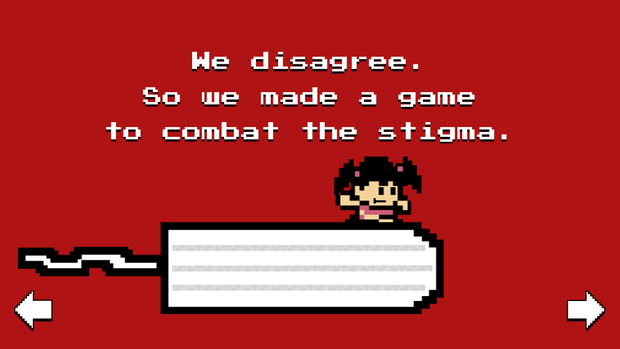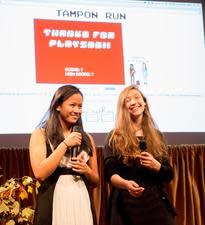Teen girls build game that lets you throw tampons at period shamers to fight menstrual taboos

An intro slide on Tampon Run.
Image: Tampon Run
She's a hero armed with tampons, with a mission to rid the world of menstrual taboos. She says things like "I'm chauvinism's worst nightmare!" and "it's an essential bodily function!"
She runs, shoots feminine products at her enemies, and jumps in the air to reach boxes of more ammo. The tampons spread and fly away after they've successfully nailed those period shamers.
Tampon Run is engrossing. Before I realize it, I've played several rounds. I finally look up, and I feel like I've defeated something larger than my last score.
Turns out, throwing tampons at mean boys is extremely empowering.
Tampon Run is an 8-bit game created by Sophie Houser and Andrea Gonzales. The app version just launched in the Apple App Store this week, though their web version was released last fall. It was a hacking project through Girls Who Code, which turned into a mission for a movement, an outlet for feminism and a way to tackle misogyny. It has become a force to help the world get over the stigma surrounding periods.
"It's surreal to see how we were thrust into this environment where we were suddenly talking about women in tech all the time or we were talking about menstruation all the time," Gonzales said. "Hearing feedback from all of these people all over the world has been really exciting. Our hard work is all the more worth it."
Houser and Gonzales met at Girls Who Code's Summer Immersion Program last summer. For seven weeks, the group learned some sort of programming concept and completed a mini group project about it, and listened as influencers in the tech industry gave presentations and answered questions. The education culminated in a final project, where they were allowed to build whatever they wanted.
Gonzales wanted to make a game that targeted the hypersexualization of women in gaming, so she and Houser started brainstorming.
"I jokingly said, 'Why don't we make a game about a girl who throws tampons, that would be funny," Houser said. "And we laughed, because it was funny. Then we realized there was actually something there and this had to do with something we had both experienced."
There is definitely a menstrual taboo in the US. Periods and PMS are often the subject of jokes and casual sexism. Many women still feel like they have to hide their tampons when going to the restroom, and they often don't feel comfortable talking about their periods with anyone -- especially men.
This taboo is even perpetuated in the tech world -- one Mashable writer recently wrote a powerful article about being pitched a period tracker app that was created by a group of men so they the could "relinquish the fear and confusion of men, and allow women to be more tuned into their own cycle and symptoms." And they weren't kidding.
After some research, Houser and Gonzales realized the menstruation taboo was a much larger global issue. Women around the world -- from many countries in Africa to Nepal to India -- are isolated when they are on their period, and many young women miss a week or more of school every month, or are pulled out of school permanently. Due to the lack of proper, hygienic pads and tampons, women often reuse old cloth rags, which greatly increases their risk for cervical problems and reproductive diseases.
The original web version of Tampon Run was built in a week and a half. The two young women sat in a conference room with a beautiful view of New York City. Each day, they decided what they were going to do, and then did it. They worked on Tampon Run for a while after the Girls Who Code program ended, adding intro slides and other features, and then released it online to show their friends and family.
"[We] woke up the next day and it was written up in the UK, and in between classes we would be answering press, and my whole high school world just burst overnight," Houser said.
Houser, who is 17, attends school in Manhattan. She had no idea how to code until last summer when she participated in Girls Who Code, after her mom encouraged her to apply because of her love for math and a noticeable creative streak. This semester, her school implemented the first computer science course ever, and she excelled in it.
Gonzales is 16, and is now in the middle of her junior year of high school. Her school in Manhattan offers AP Computer Science, which she is currently taking, and there are three full classes this year because the interest in the subject has grown so much.
Gonzales knew she wanted to be in the tech world long ago, because her dad was a computer programmer. As a kid, she read a lot of books about teens saving the world, and always identified with the one in the gang who could open all the doors and hack into the security system.
"I wanted to be in that in my hypothetical save-the-world teen gang," she said.
The Girls Who Code Summer Immersion Program was an invaluable experience for both of them. "We were sitting around a table with 20 girls from such diverse backgrounds from all around the city, some from New Jersey, and we all got to know each other," Houser said. "It was so wonderful because [the coding] is so frustrating and then get it to work, it feels so good. Everything was in teams, and it was really nice to come together around coding."
After Tampon Run blew up in the media, Houser and Gonzales wanted to bring it to iOS as an app. It was a hacky-type project before, Houser said, so being able to go through the process of building an app was an empowering experience.
With the iOS app, there are several new features to the game, including Apple Game Center achievement, a leader board, new enemies, and it now becomes more difficult over time. The two young women worked with an agile software development company called Pivotal Labs, which helped them build the app, pro bono. It took seven weeks, and Houser and Gonzales went into the office everyday after school to pair with programmers who taught them how to make it.
"Andy and I got to learn more about coding, hone our skills and see how the app actually came together. We were in on every step of the process," Houser said. "We had team meetings on new features and discussed pros and cons -- which were the most technically feasible [features], where should the buttons go, what was working or not."

Andy Gonzales and Sophie Houser
Image: Robin Haden
Gonzales actually spent the majority of her winter break there, working from 9 to 6 daily. She said it gave her a great glimpse into the life of a developer, which was exciting for her because she had such a good time doing it.
"It's changed how I see the world as a whole, I think. I knew I was into computer science and coding for a while now, but not really until Tampon Run launched and I interacted with all these different corners of the tech world was I able to understand how many ways I could go with my knowledge of coding," Gonzales said.
She has another year and a half of school left, but Gonzales wants to major in computer science and experiment with the different ways she can enter the tech world, including gaming. Houser will be attending Brown University in the fall, where she plans on majoring in computer science.
The two have both been inspired by the effort and collaboration it takes to be successful entrepreneurs. They text constantly, meet face-to-face, and take press calls together as often as they can. They bounce ideas off of one another, consult about every decision, and support each other when they have prior commitments to things that teenage girls do -- like SAT prep and college applications, piano lessons and robotics competitions.
"It's such a rewarding process to use code in this way, and it's incredible how receptive people have been. We couldn't have had this whole journey without people advising and supporting, and it's incredible to see all the emails we've gotten," Houser said.
Emails that said things like: "I saw your game, and now I want to learn how to code," or "I saw your game and I love what you're doing, and we need more women in tech," or "I saw your game, and I didn't feel comfortable talking about menstruation before, but now I feel fine about it."
Their hope with the mobile app is that -- since smartphones are now the primary way to get and share information, particularly in the parts of the world where menstrual taboo is prevalent -- Tampon Run will now reach a larger audience, and they want to make it available for Android soon as well.
The entire process has also been rewarding because it has made them more comfortable talking about menstruation. The real mission of the game is to promote the discussion about the taboo that surrounds this bodily function, and simultaneously, it shows the importance of diversity in the gaming industry.
After all, a man wouldn't have built this game. Sure, many men seem to think they know what women and their reproductive organs need. But doing something to de-stigmatize periods? That's something they probably won't touch.
Tampon Run serves as a great example of the integral role women -- and teenage girls -- can play in video games and the tech industry as a whole.

